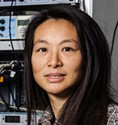S+S, Fall 2024
The Eye & Ear Foundation is happy to announce this year’s recipients of the Wiegand Fellowship and the Wiegand Entrepreneurial Research Award. The Wiegand Fellowship was established in the Department of Ophthalmology to support research being done on advancing imaging of the eye.
The Wiegand Entrepreneurial Research Award was created to help support research in the Department of Ophthalmology or Otolaryngology-Head & Neck Surgery for projects that show great promise for commercialization. These funds were made possible by generous philanthropic support from Mr. and Mrs. Bruce and Barbara Wiegand.
2024 Wiegand Fellowship Winner – Dr. Susannah Waxman

Dr. Susannah Waxman is a Postdoctoral Researcher in the University of Pittsburgh’s Department of Ophthalmology. She completed her PhD in Cellular and Molecular Pathology in Dr. Ian Sigal’s Laboratory of Ocular Biomechanics. After she earned her bachelor’s degree at Ohio Wesleyan University, she worked as a laboratory manager in Dr. Nils Loewen’s Laboratory for Aqueous Humor Outflow Tract Engineering. Her current research is focused on the role of astrocytes in glaucoma.
In her project, Dr. Waxman will investigate how astrocytes in the human lamina cribrosa respond to increased eye pressure. Using specialized visualization techniques, she will characterize changes in astrocyte structure during the initial stages of elevated pressure and map the corresponding changes in astrocyte gene expression. By uncovering these early changes in the human eye, her goal is to shed light on the mechanisms behind the initiation of optic nerve damage in glaucoma patients. Through learning how astrocytes react to the early stages of high eye pressure, she aims to inform new ways to detect and treat early-stage changes that can otherwise lead to irreversible blindness, ultimately helping to protect vision.
2024 Wiegand Entrepreneurial Research Award Winner – Xing Chen

Dr. Xing Chen is an Assistant Professor in the University of Pittsburgh’s Department of Ophthalmology. Dr Chen specializes in brain-computer interfaces, visual neuroscience, blindness, and chronic recording and microstimulation in non-human primates. She obtained her bachelors in Neuroscience at the University of Southern California, her PhD in Neuroscience at Newcastle University in 2014, and carried out her postdoctoral work at the Netherlands Institute for Neuroscience before joining Pitt in 2022.
The Chen lab is working to restore lost vision through a neuroprosthesis that bypasses the eyes by interfacing directly with the brain. Key features of this device include ultra-flexible probes with high-channel-count and high-density electrodes yielding higher image resolution, extensive coverage of the visual field, and long-term durability. The goal is to allow blind people to recognize objects and navigate more independently. In addition, the device opens new horizons for more accurate and localized neuromodulation therapies to treat diseases ranging from epilepsy to movement disorders.
2024 Wiegand Entrepreneurial Research Award Winner – Robert Shanks

Rob Shanks is an Associate Professor in the University of Pittsburgh’s Department of Ophthalmology. He completed a PhD in Molecular and Microbiology at Tufts University Medical School, and a postdoctoral fellowship at the Dartmouth Medical School. He is Director of the Charles T. Campbell Laboratory of Ophthalmic Microbiology. His research focuses on basic and translational projects regarding ocular infections and inflammation.
Dr. Shanks’ project is geared towards improving drug delivery to the surface of the eye. His lab’s solution is to apply “anchors” to biologics to allow them to stay on the ocular surface for a longer time. This study will extend the capability of the anchoring technology using another class of biologics, the growth factors. He proposes that anchored growth factors can be used to help treat nerve related diseases and wound healing problems of the ocular surface. Success of this project will help propel the approach of using anchors as a platform for the biologic class of drugs to be used on the ocular surface and help restore a good quality of life to patients with ocular surface diseases.